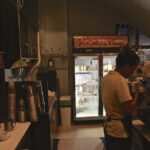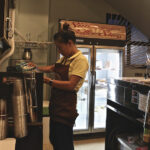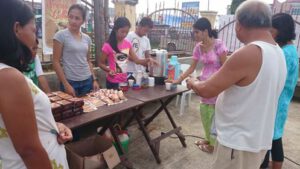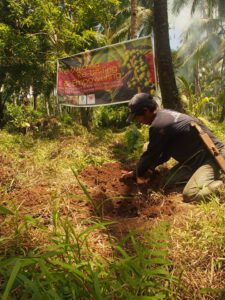At the base of the newly built Carillon Tower inside the Redemptorist Church in Baclaran, the aroma of coffee seeps from a quaint café to worshipers plying the church’s main walkway.
A little known secret among patrons of the National Shrine of Our Mother of Perpetual Help, Sinirangan Coffee (the product of typhoon Yolanda survivors from Eastern Samar) has found a home to brew.
The Sinirangan Coffee Shop at the Carillon Tower breezed by its fourth month in business, starting with a small coffee menu to one that includes juices, cakes and pastries, lasagna and sandwiches to churchgoers needing to drink, eat, sit or rest. The coffee shop pumped new vigor to the production of coffee in the typhoon-ravaged towns of Eastern Samar.
From soil to cup
[/ult_animation_block][ultimate_spacer height=”150″]Starting as a post-disaster livelihood project, Sinirangan Coffee was initiated by the Permanent Commission on Social Mission Apostolate (PCSMA) of the Redemptorist Missionaries in 2014. The program consisted of the planting of coffee and processing of coffee beans in typhoon Yolanda-stricken towns in Eastern Samar.
“Coconut is the main livelihood of the Eastern Visayas farmers and most coconut trees were uprooted after Yolanda. Coconut would take seven to eight years to grow. The people need an alternative livelihood,” shared Bro. Ciriaco “Jun” Santiago III, head of the PCSMA.
Coffee plants themselves would need two to three years to yield coffee beans. For now, the PCSMA sources Arabica and Robusta beans from different parts of the country. These beans were processed by locals in the Sinirangan Coffee production house in General MacArthur town, Eastern Samar. Sinirangan Coffee was flavored its own roast and repacked for distribution outside Eastern Samar.
Selling the coffee in Eastern Samar proved to be a challenge in economic and cultural terms: the locals were used to the taste of cheap instant, 3-in-1 coffee of multinational brands; they do not have the tools to brew the healthier and tastier coffee; and, they could not stock up in coffee and buy them instead in retail from the sari-sari store.
“We first deployed airpots of brewed coffee to sari-sari stores and sold the coffee per cup. It is a way to introduce and familiarize them with the taste,” said Bro. Jun.
But such effort was trivial compared to the need to keep production growing and keep the farmers employed. Sinirangan Coffee must grow its market.
The next phase of the project consisted of establishing several cooperative coffee shops in Eastern Samar and one outside the province. The PCSMA foresees these coffee shops would become self-sustaining eventually.
First of these coffee shops to be established might be its biggest branch ever, nowhere else but in the ever-populous shrine of the “Ina ng Laging Saklolo”. The coffee shop opened on November 4, 2015.
The coffee shop offers a variety of coffee drinks, all of which use Sinirangan Coffee as base. Of course, packs or jars of coffee beans and ground coffee—their original product—are sold in the café.
Funding organic farming, education
[/ult_animation_block][ultimate_spacer height=”150″]
With the revenues from the coffee shop, the PCSMA intends to send high school and college students from the towns of General MacArthur, Giporlos, Llorente and Quinapondan in Eastern Samar and to support organic farming also in these areas.
“We plan to send 20 college students and 30 high school students to school in the first year of operations of the coffee shop,” shared Bro. Jun.
The PCSMA has started contributing farming inputs in Llorente and Quinapondan in 2014, bringing tools, seeds and organic fertilizers to farmers. They also mobilized farmers in bayanihan efforts to cultivate the lands ravaged by the supertyphoon to be able to plant on them again.
Hiring and training from informal work, self-employed
[/ult_animation_block][ultimate_spacer height=”150″]The coffee shop crew was hired from the roster of mission partners of the Oblates of the Most Holy Redeemer nuns. These were from people who worked in temporary, informal or even antisocial means of livelihood before. They were given “barista” training, a skill they may be able to use beyond employment in the coffee shop. The crew are working towards a regular employment status in the coffee shop, an opportunity quite rare in Metro Manila nowadays.
Some of the cakes and pastries were also sourced from graduates of free skills and livelihood trainings of the Redemptorist Missionaries.
Supporting political prisoners
[/ult_animation_block][ultimate_spacer height=”150″]
The coffee shop also sells mugs bearing paintings and illustrations of current political prisoners in the Philippines.
“Some of these political prisoners are from Eastern Visayas. Their families have a hard time visiting them when detained in prisons outside the region,” said Bro. Jun.
All proceeds from the mugs go to the political prisoners for their small, basic needs inside detention.
Human rights group KARAPATAN tallied the number of political prisoners at 557; 301 of them detained during the presidency of Benigno Aquino III.
Typhoons and land reform
[/ult_animation_block][ultimate_spacer height=”150″]At the beginning of planting, there were 26,000 coffee seedlings planted in the towns of General MacArthur, Giporlos, Llorente and Quinapondan. But only 18,000 were left after typhoon Hagupit (Ruby) came in December 2014. Said typhoon was the second strongest that passed that year and it made its first landfall in Eastern Samar with winds at 165 km/h (105 mph).
“We try to find ways to help the farmers become more resilient to natural disasters. But it is really the lack of support to agriculture and the lack of land reform that has kept the farmers in this vicious cycle,” said Bro. Jun.
The PCSMA plans to build more Sinirangan coffee shops in Redemptorist churches to further expand the market of their product as well as the roasting capacity of the production house in General MacArthur, which in turn increases the employment opportunities for families in the deprived areas.
“It is really the collective efforts of the farmers in the countryside and the workers in the coffee shop that make this project work. Imagine what could be achieved if only the government could support these hardworking people on a national scale,” said Bro. Jun.
—-
Sinirangan Coffee Shop is open for business on Wednesday and Sundays from 6 am to 11pm and all other days of the week from 8am to 10pm.



































